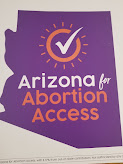Interesting battles are continuing in Maricopa County Recorder Stephen Richer's defamation case against Kari Lake, and the judge has promised a quick ruling on whether Lake, her husband and her entities have disclosed all of the relevant individuals.
Superior Court Judge Randall Warner also indicated that he would soon be ruling on whether Lake attorney Jennifer Wright can withdraw from the case - a move that Richer's attorneys oppose.
A brief status conference was held this morning on the discovery matters. Last week, the judge ruled that Richer can pursue broad discovery to help them prepare for the hearing later this year on the amount of damages caused by Lake's defamatory statements about Richer's handling of the 2022 elections. (Judge Warner reiterated that Lake admitted the falsity of Lake's anti-Richer campaign when she voluntarily defaulted on the Complaint.)
Representing Richer, Janine Lopez told the court that Lake should have disclosed not only the names of people who helped Lake with her social media, financial consultants who may have discussed with her the money-raising aspects of the attacks, and persons in Lake's life who "may have pushed back" against the strategy, but also substance of what knowledge those people could be expected to testify about.
Today's conference also disclosed that the parties see Lake's husband, Jeffrey Halperin, as a possible key to the damages issue. Lopez singled him out, and Halperin's attorney (William Fishbach) acknowledged that there is a "minor schism" between Lake's and Halperin's defenses.
Because Arizona is a community property state, spouses are routinely named as defendants in these types of cases.
Richer's attorneys promised to get a list of Lake's alleged disclosure deficiencies by the end of the day. They also have a deadline for tomorrow to tell the judge what documents they believe Lake must disclose.
Judge Warner indicated that he will likely do a private (in camera) inspection of the documents before issuing an order. Warner also told the parties that he sees the required disclosure process "as a dialogue", and that parties should first communicate with each other about perceived deficiencies before coming to him.
The parties did meet and confer yesterday about how long the discovery process should last in light of last week's decision. Lopez said "the parties agreed to a 3-4 month extension of the discovery schedule."
A pre-trial conference was slated for September 10, so the agreement indicates that the damages hearing will likely slide beyond the November election (in which Lake is expected to be on the ballot for the U.S. Senate seat currently held by Kyrsten Sinema).
Other bubbling disputes between the parties were not the subject of today's status conference, but loom on the horizon.
Judge Warner indicated that he is aware of Jen Wright's contested Motion to Withdraw as counsel for the "Kari Lake for Arizona" 2022 campaign committee, and will rule shortly.
Wright contends that since Lake was the chair/officer/director of the now-terminated committee, she cannot bill her client for her involvement. She explained to Arizona's Law:
"As you know, I am an elections attorney, not defamation. I helped recruit my replacement to ensure someone with the relevant background could represent Kari, and I was pleased that we found good counsel. Now that I only represent KLA, I realized I have no entity to bill, and because I respect Kari, I think it is outrageous to make her pay for me when she is adequately represented by Wilenchik & Bartness."
Richer's team opposes her withdrawal, noting that the entity is still an active corporate entity even though it cannot file campaign finance reports, that it still has its own discovery obligations, and that Wright can be compensated by others (such as Lake).
Arizona's Law reviewed campaign finance filings from both Lake's 2022 committee and her current senatorial campaign committee. No payments to Wright were found in either 2023 or 2024.
The filings in the Wright withdrawal dispute also show that a deposition for a representative of "Kari Lake for Arizona" is set for next Thursday. Lake is the only listed Officer and Director. (The corporation is also listed as active and in good standing although the Corporation Commission website shows that it is more than one year delinquent in filing the required annual report.)
(Later: Wright correctly points out that the ACC website notes under a separate tab that Lake last week filed to dissolve the corporation. The filing is "pending".)
Halperin's attorney also told the court that there is an outstanding (documents) subpoena to Maricopa County to learn more about its "taxpayer-funded" real time tracking of social media. "We were really shocked this was not disclosed to us previously," Fishbach told the judge.
This article was reported by AZ Law founder Paul Weich.
"AZ Law" includes articles, commentaries and updates about opinions from the Arizona Supreme Court, U.S. Supreme Court, as well as trial and appellate courts, etc. AZ Law is founded by Phoenix attorney Paul Weich, and joins Arizona's Politics on the internet.















